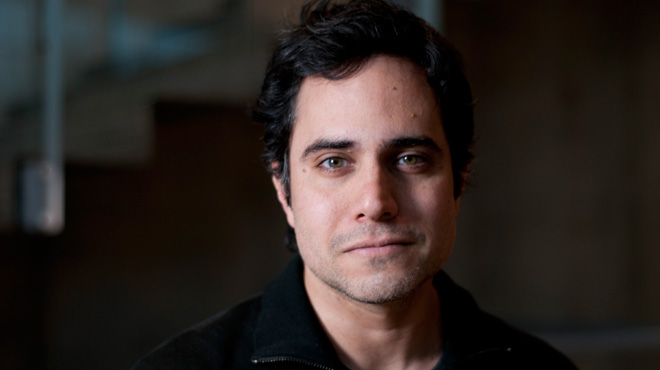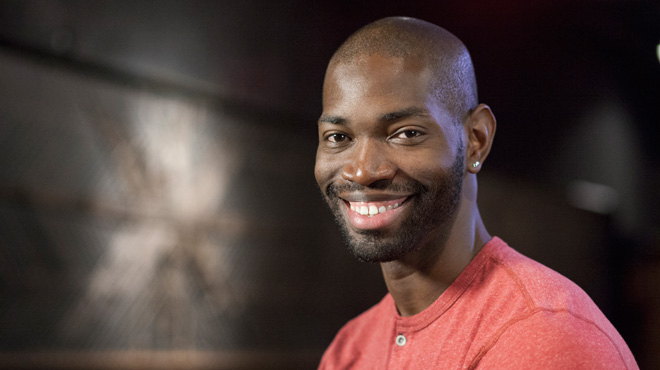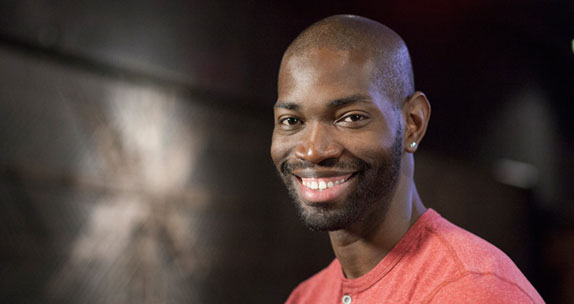While they may come from different backgrounds and different parts of the country, both talented young playwrights featured in Robert Levi‘s film Playwright: From Page to Stage seem to be on the same path toward having a long and prolific career. Rajiv Joseph, whose play Bengal Tiger at the Baghdad Zoo, as we see in the film, goes from a successful debut in Los Angeles to the even bigger stage under the lights of Broadway, won the NEA Award for Outstanding New American Play and was nominated for a Pulitzer Prize. Meanwhile, Tarell Alvin McCraney, of whose Brother/Sister Plays trilogy The New York Times wrote “you experience the excited wonder that comes from witnessing something rare in the theater: a new, authentically original vision,” was nominated for an Olivier Award for Outstanding Achievement at an Affiliated Theatre when the piece ran in London.
Clearly, they were off to a good start. But after watching Playwright, which premieres tonight on Independent Lens on PBS at 10 PM [check local listings], viewers will no doubt be curious as to what the two gifted writers have been working on since the time frame captured in the film.

Playwright Rajiv Joseph
Joseph’s subsequent play Gruesome Playground Injuries had its world premiere in Houston, starring Selma Blair and Brad Fleischer, before moving to Washington D.C. and then New York City, where it starred Pablo Schreiber and Jennifer Carpenter. Other new plays include The North Pool, The Monster at the Door, and The Lake Effect, which have played in locations as varied as Silicon Valley, the Berkshires, Houston, and Chicago. The North Pool won the 2011 Glickman Award for Best Play to Premiere in the Bay Area. While none of those plays have received the accolades awarded Bengal Tiger (admittedly hard to top), they kept Joseph fresh and working and honing his craft.
His screenplay Draft Day, co-written with Scott Rothman, managed to become the top-ranked script on the 2012 “Black List” (which is the film industry’s subjective annual list of the best unproduced screenplays). That film went into production this year, shooting in Joseph’s hometown of Cleveland, starring Kevin Costner and Jennifer Garner, and directed by Ivan Reitman (Ghostbusters, Dave).

Playwright Tarell McCraney
Tarell McCraney, meanwhile, was the recipient of a 2013 MacArthur Fellowship, the “genius grant” that will help the writer continue on his path of creating work in both the USA and the UK. Since graduating from Yale, McCraney:
has worked extensively with the director Tina Landau; their most recent collaboration was “Head of Passes” at the Steppenwolf last season, a piece inspired by the Book of Job. That play, like most all of McCraney’s work, combines the exploration of ancient Mythic themes (“The Brother/Sister Plays” is steeped in Yoruba mythology) with a compassionate treatment of contemporary American lives. [via Chicago Tribune]
NPR’s Mark Blankenship wrote more about McCraney’s work after the announcement of the MacArthur award:
The force of that emotion strikes me as something that can’t be voiced. McCraney takes me to the edge of grief and shame, but then he leaves me — and trusts me — to feel the rest on my own.
I overlapped with McCraney in graduate school, and even his student work had that effect on me. His writing has always evoked that awful heaviness of not knowing if you belong. It’s the weight of things you can’t even say to yourself, things that dominate your mind and your life, even when you’re making noise.
He was also the subject of this profile in the Guardian (UK), to go alongside McCraney’s direction of Antony and Cleopatra at the Royal Shakespeare Company.
A number of black British actors have said they moved to the US for meatier roles. Is casting there less subject to stereotype?
I’ve heard British actors say that – but actors from the US say the same thing the other way round. I actually think we see way more representations of people of colour on stage in the UK than in the US. Just recently in London, we’ve had James Earl Jones doing Much Ado, The Scottsboro Boys at the Young Vic and The Amen Corner at the National. In the US, we tend to see the same three or four plays produced over and over.What’s the best advice anyone ever gave you?
One of my professors told me I had to work really hard because I didn’t have much talent. I don’t know about the talent part – surely it’s subjective – but it did inspire me to work hard. I’m usually up at six, and still in the rehearsal room at nine or ten o’clock, way after the cast have left.
Both these two playwrights, with their unique perspective on the world around them, will continue to be writers to keep an eye on, to see where their paths lead them next.
